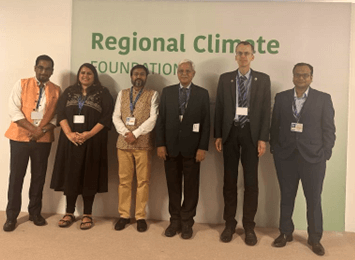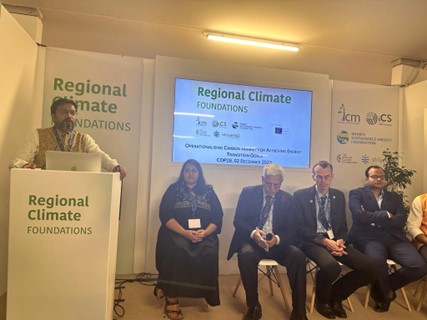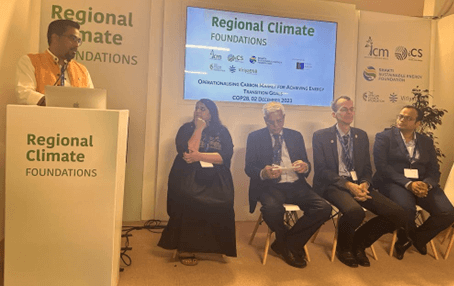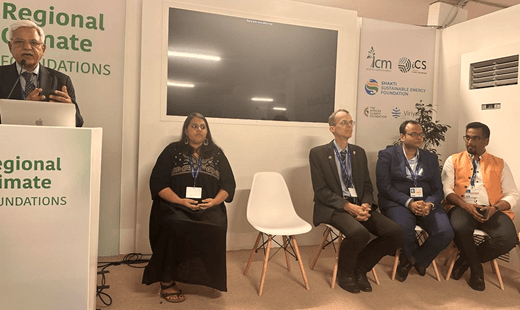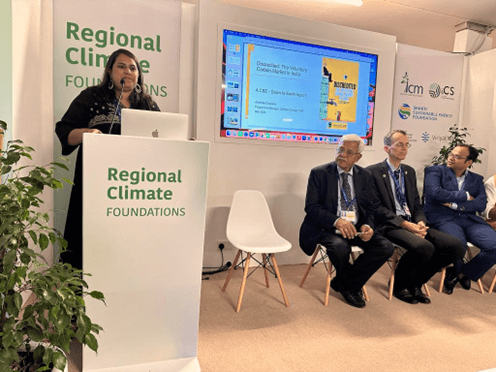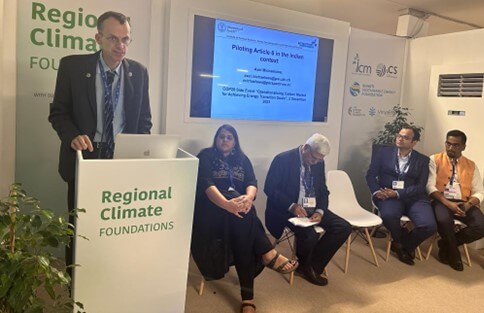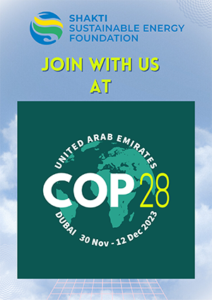
Venue: Regional Climate Foundations Pavillion- COP28 (Pavilion No – TA3-145), Blue zone– B7 and building 88 (Ground floor of building 88, left-hand side)
Date: December 2, 2023
Time: 14:00 to 15:30 GST
Moderator: Shubhashis Dey, Director – Climate Policy & Climate Finance, Shakti Sustainable Energy Foundation
The event, titled ‘Operationalising Carbon Market for Achieving Energy Transition Goals,’ was moderated by Shubhashis Dey, Director, Climate Policy & Climate Finance, Shakti. It aimed to bring together stakeholders from civil society and business. The objective of the event was to facilitate discussions and enhance understanding regarding the role of the carbon market in achieving energy transition goals in the global south, including India.
Participants:
- RR Rashmi, Distinguished Fellow and Programme Director, Earth Science and Climate Change, The Energy and Resource Institute
- Axel Michaelowa, Senior Founding Partner, Perspectives
- Subrata Chakrabarty, Associate Program Director, Climate, World Resource Institute, India
- Avantika Goswami, Programme Manager, Climate Change at the Centre for Science and Environment
- Deepak Yadav, Programme Lead, The Council on Energy, Environment and Water
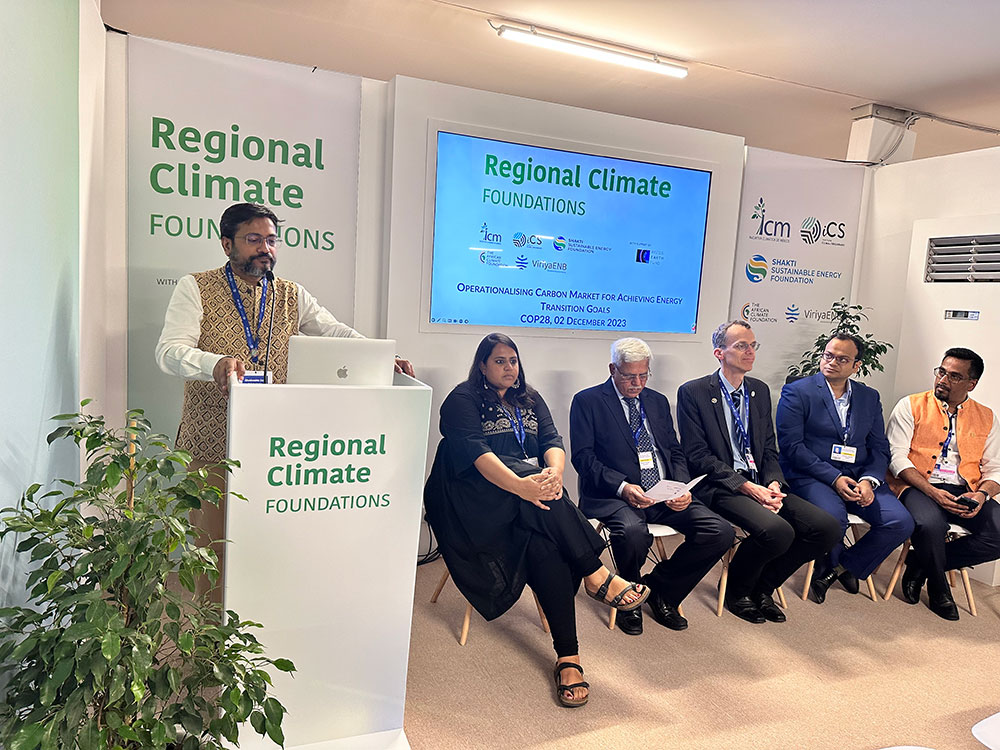
Indian Green Credit scheme was launched during the visit of our Honourable Prime Minister of India, Shri Narendra Modi to COP28 in Dubai. The GCP works towards developing a market-based mechanism and aims to provide Green Credits as incentives to a diverse array of entities, ranging from individuals and Farmer Producer Organisations to cooperatives, forestry enterprises, sustainable agriculture ventures, Urban and Rural Local Bodies, private sectors, industries, and organisations. The scheme is expected to socialise the benefits of climate finance among communities who majorly remains un-served under traditional mechanism of climate finance. With this back drop a group of Indian and international climate finance experts reflected on India’s carbon pricing strategies (tool for climate mitigation or/ and raising additional finance) for dealing with international commitments and national priorities.
As the window of opportunity for arresting climate change is narrowing and the key question which remain unanswered is “where are the resources and how to mobilise the available resources effectively?”.
A panel of distinguished climate experts deliberated on the following issues:
- Role of carbon market in shifting sectors away from fossil-intensive technology lock-in
- Promoting low carbon investments
- Providing strong price signal to investors
- Potential mechanisms for the government to raise revenues through carbon market
- Impact of carbon pricing on competitiveness of hard to abate sectors undergoing energy transition

Questions for the panellists for session on ‘Operationalising Carbon Market in India’
RR Rashmi, Distinguished Fellow and Programme Director, Earth Science and Climate Change, The Energy and Resource Institute
- The funding gap in climate adaptation and cleantech R&D is considerable. Is there merit implementing a Carbon Border Adjustment Mechanism to generate revenue for climate adaptation, clean teach R&D etc. in India?
- In your opinion, what will be the impact of the carbon pricing (market & tax) on the industrial competitiveness of India’s energy-intensive sectors?
Axel Michaelowa, Senior Founding Partner, Perspectives
- In your opinion, what key considerations should India prioritise while negotiating the crediting mechanisms bilaterally with other countries under Article 6.2?
- From your perspective, what will be the anticipated size of the global carbon market by 2030? Additionally, which countries do you believe will play a pivotal role in influencing supply and demand of carbon credits and why?
Subrata Chakrabarty, Associate Program Director, Climate, World Resource Institute, India
- Several analyses indicate that integrating a domestic carbon market with a global or regional Emission Trading Scheme can effectively tackle climate change and foster international cooperation. However, there are challenges involved. From your perspective, how feasible or challenging is this integration?
- The demand for carbon credits is anticipated to increase in the future. Nevertheless, ensuring a consistent supply of high-quality carbon credits poses challenges. In your opinion, what types of safeguard mechanisms do market administrators need to implement to ensure the quality of carbon credits?
AvantikaGoswami, Programme Manager, Climate Change at the Centre for Science and Environment
- The Voluntary Carbon Market (VCM) has come under scrutiny recently, which has led to fluctuations in prices and perception of the market. In your opinion, what reforms are recommended in the VCM to ensure real climate benefits?
- How can we ensure that communities derive benefits from community-based offset VCM projects?
Deepak Yadav, Programme Lead, The Council on Energy, Environment and Water
- Is there merit in transitioning from an offset-based market to an allocation-based market? What steps are involved in making this transition?
- Within the EU-ETS framework, once allocations are reseased into circulation, any individual or company with an account in the EU-ETS can engage in buying and selling these allocations. In your opinion, should India start considering the establishment of a secondary carbon market? Please do share the rationale behind your response.
Speaker’s bios
RR Rashmi, Distinguished Fellow and Programme Director, Earth Science and Climate Change, The Energy and Resource Institute
 Mr Rajani Ranjan Rashmi is engaged with the Resource Efficiency & Governance Division of The Energy and Resources Institute as a Distinguished Fellow. At TERI, Mr Rashmi works on issues relating to climate policy, strategy, carbon markets, and environmental sustainability.
Mr Rajani Ranjan Rashmi is engaged with the Resource Efficiency & Governance Division of The Energy and Resources Institute as a Distinguished Fellow. At TERI, Mr Rashmi works on issues relating to climate policy, strategy, carbon markets, and environmental sustainability.
A retired officer of the Indian Administrative Service, Mr Rashmi is an expert on climate change related policies, strategy, actions, and international negotiations. He has been involved with formulation and implementation of public policies of the central and state government in the field of environment, commerce, and finance for over 35 years.
Mr Axel Michaelowa, Senior Founding Partner, Perspectives
 Axel Michaelowa has a PhD in Economics and has worked on international climate policy instruments and the UNFCCC process since 1994. He is senior founding partner of Perspectives, and part-time researcher at the Institute of Political Science of the University of Zurich. Axel consults private, governmental and public institutions on international carbon markets and the design of domestic climate policy instruments and has written more than 400 research articles and studies on these topics. Axel is a member of the roster of experts of the Article 6.4 Supervisory Body.
Axel Michaelowa has a PhD in Economics and has worked on international climate policy instruments and the UNFCCC process since 1994. He is senior founding partner of Perspectives, and part-time researcher at the Institute of Political Science of the University of Zurich. Axel consults private, governmental and public institutions on international carbon markets and the design of domestic climate policy instruments and has written more than 400 research articles and studies on these topics. Axel is a member of the roster of experts of the Article 6.4 Supervisory Body.
Subrata Chakrabarty, Associate Program Director, Climate, World Resource Institute, India
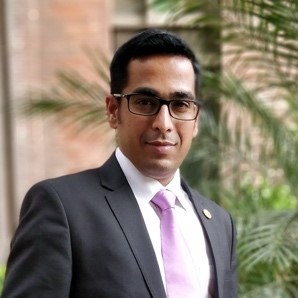 Subrata is Associate Program Director with the Climate Program at WRI India. He is involved in research based on the thematic areas of informing the next round of ambitious climate actions and long-term strategies. He also supports subnational engagements with the Indian states and corporate climate action work. He is also recognized as Climate Policy Expert within Article 6.4 Mechanism Roster of Experts by the Supervisory Body (SB) under UNFCCC.
Subrata is Associate Program Director with the Climate Program at WRI India. He is involved in research based on the thematic areas of informing the next round of ambitious climate actions and long-term strategies. He also supports subnational engagements with the Indian states and corporate climate action work. He is also recognized as Climate Policy Expert within Article 6.4 Mechanism Roster of Experts by the Supervisory Body (SB) under UNFCCC.
Avantika Goswami, Programme Manager, Climate Change at the Centre for Science and Environment
 Avantika is a Programme Manager in the Climate Change Programme at the Centre for Science and Environment (CSE). Her interests lie at the intersection of climate science and political economy, and her current work focuses on transformative solutions to rapidly reduce carbon emissions while centering climate justice and equity. At CSE, she is leading the Institute’s work on climate finance, mitigation ambition, carbon markets, methane, forest-based mitigation, trade, and the tracking of UNFCCC negotiations.
Avantika is a Programme Manager in the Climate Change Programme at the Centre for Science and Environment (CSE). Her interests lie at the intersection of climate science and political economy, and her current work focuses on transformative solutions to rapidly reduce carbon emissions while centering climate justice and equity. At CSE, she is leading the Institute’s work on climate finance, mitigation ambition, carbon markets, methane, forest-based mitigation, trade, and the tracking of UNFCCC negotiations.
Mr Deepak Yadav, Programme Lead, Council on Energy, Environment and Water
 Deepak works on the sustainability analysis of low carbon and renewable technologies for industrial decarbonisation. At the Council, his work involves developing a roadmap for hard-to-decarbonise industrial sectors, engaging with industry partners on carbon mitigation strategies and supporting policy-making with insightful analysis.
Deepak works on the sustainability analysis of low carbon and renewable technologies for industrial decarbonisation. At the Council, his work involves developing a roadmap for hard-to-decarbonise industrial sectors, engaging with industry partners on carbon mitigation strategies and supporting policy-making with insightful analysis.
Deepak is currently focussing on alternative fuels, renewable hydrogen and low-carbon energy sources such as natural gas for mitigating industrial emissions. His research involves technology assessment and forecasting, economic analysis and life cycle assessment of competing technologies for enabling transition in the industrial sector. Prior to joining the Council, he worked as a project engineer in the conceptualisation-to-commissioning of a megawatt-scale concentrated solar power (CSP) plant.
